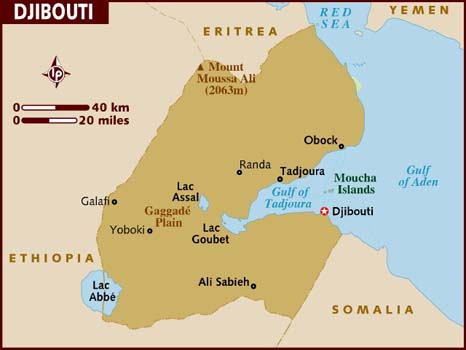Macron’s East-Africa charm tour
March 14, 2019 | Expert Insights
President Emmanuel Macron visited former French colony Djibouti with promises of a “respectful” partnership in the face of growing African indebtedness to China, which is fast expanding its foothold on the continent.
Background
Emmanuel Macron is a French politician serving as President of France since 2017. He previously was Minister of the Economy, Industry and Digital Affairs from 2014 to 2016.
East Africa or Eastern Africa is the eastern region of the African continent, variably defined by geography. In the United Nations Statistics Division scheme of geographic regions, 20 territories make up Eastern Africa: Burundi, Comoros, Djibouti, Eritrea, Ethiopia, Kenya, Mauritius, Mozambique, Madagascar, Malawi, Réunion and Mayotte (French overseas territories), Rwanda, Sudan, Somalia, South Sudan, Seychelles, Tanzania, Uganda, Zambia and Zimbabwe.

Analysis
French President Emmanuel Macron kick-started his charm offensive tour of Eastern Africa by visiting the capital of Djibouti. The country is an essential ally in the fight against regional piracy and due to its geographic location, it offers a strategic vantage point of the Persian Gulf and the Arabian Sea.
Both Paris and Beijing — as well as Japan and the United States — have military bases in East Africa’s smallest country due to its strategic location along a key shipping lane leading to the Suez Canal.
Macron described Djibouti, the last colony to gain independence from France — in 1977 — as a “historical partner and strategic ally,” and “the point of entry” to the Horn of Africa region. Its geographic importance forms the foundation of Djibouti’s hopes of becoming a major trading hub.
Two years ago, it inaugurated its newest and biggest port — part of infrastructure expansion, partly funded by China, that includes three other ports and a railroad to the capital of landlocked Ethiopia. Djibouti President Ismail Omar Guelleh’s administration hopes to turn the country into a “new Dubai” competing for business with overcrowded African ports such as Mombasa in Kenya.
Sandwiched between Ethiopia, Somalia and Eritrea, tiny Djibouti is a crucial part of Beijing’s “Belt and Road” global infrastructure initiative along what has been dubbed the “Maritime Silk Road.” It allows China to reach Africa and Europe via the Indian Ocean. The project has seen Beijing lend huge amounts of money to developing countries in Asia and Africa in order for them to develop infrastructure and ease trade.
However, the International Monetary Fund has sounded the alarm over an increase of Djibouti’s public debt from 50 percent of GDP in 2014 to 85 percent in 2017. The U.S.-based China Africa Research Initiative in 2017 estimated Djibouti’s debt to China to be at approximately $1.3 billion.
“I would not want international investments to weaken the sovereignty of our partners,” Macron said Tuesday, in a reference to China’s growing African presence. “French companies are able to offer a respectful partnership,” the president added.
Guelleh, who described himself as “a great friend of China” when he visited President Xi Jinping in 2017, told Macron: “There are opportunities for French companies, particularly in the field of infrastructure...Our country is open, I have not lost hope that France can boost its investments in Djibouti.”
Macron visited the remote Ethiopian town of Lalibela with its renowned 13th-century church complex, a UNESCO World Heritage site. He promised to “finance and assist the work with the Ethiopians to restore these churches” threatened by erosion and temporarily covered by vast metal-and-tarpaulin structures much hated by locals.
Macron is scheduled to attend a state dinner in the Ethiopian capital Addis Ababa. On Wednesday, he will meet leaders of the African Union before making the first-ever trip to Kenya by a French president. He will attend the One Planet Summit in Nairobi on reversing climate change. Rwanda meanwhile, has invited Macron to attend the 25th anniversary of the country’s 1994 genocide that killed some 800,000 of its citizens. Rwandan authorities have long accused France of complicity in the massacre. Macron has not indicated whether he will attend the event on April 7 in the capital Kigali.
Assessment
Our assessment is that the Macron charm offensive is centred at countering China’s rapid expansion into Africa’s resource-rich countries in the east. We believe that Macron is leveraging France’s immense soft power in the region to build a platform for French companies to invest in Eastern Africa, as opposed to offering state-backed loans and grants.
Read more:
- China pledges US 60 Billion to Africa
- ‘New African Strategy’ to counter Russia, China
- China’s influence in Africa
- Russia’s growing influence in Africa
Image Courtesy: Kremlin.ru (https://commons.wikimedia.org/wiki/File:Vladimir_Putin_and_Emmanuel_Macron_(2017-05-29)_06.jpg), https://creativecommons.org/licenses/by/4.0/legalcode








Comments